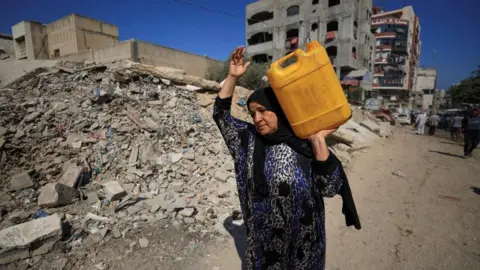The Israeli security cabinet is set to convene on Thursday to deliberate on a crucial potential decision: the full military occupation of the Gaza Strip. This meeting comes after significant escalations in the conflict, with the United Nations warning of dire and “catastrophic consequences” should such a plan be enacted. Israeli media reports suggest that Prime Minister Benjamin Netanyahu views this military action as essential for dismantling Hamas and liberating hostages who are still held captive by the group, especially after recent ceasefire negotiations have disintegrated.
However, not everyone within the Israeli ranks is in agreement. Reports indicate that both the head of the military and several ministers have reservations about the ramifications of a total takeover, stressing that this could lead to disastrous outcomes for the hostages and the civilian populace of Gaza. Miroslav Jenča, a senior UN official, expressed these concerns at a UN Security Council meeting earlier in the week, branding the situation as “deeply alarming” and potentially in violation of international law.
At present, Israeli military forces hold approximately three-quarters of Gaza, and the ongoing conflict has already led to widespread displacement of the region’s inhabitants. A continued military expansion would likely exacerbate this already dire humanitarian situation, with many more civilians facing eviction from their homes. The scheduled meeting of the security cabinet is set for 18:00 local time (15:00 GMT), where they will engage in discussions about the increased military presence required to implement the takeover.
Details emerging from Israeli media suggest that thousands of soldiers would be deployed into Gaza to enforce this military strategy. The immediate focus would be on taking control of Gaza City—home to a million residents—compelling its inhabitants to move south. Additionally, the plan includes establishing control over refugee camps located in central Gaza and targeted areas where hostages may be held captive.
In the aftermath of any initial military operations, reports indicate that a secondary offensive could be executed weeks later alongside an increase in humanitarian support. Mike Huckabee, the US ambassador to Israel, mentioned on Fox News that there would be a considerable expansion of distribution sites facilitated by the Gaza Humanitarian Foundation (GHF), which is backed by both Israel and the United States.
The GHF has faced extensive scrutiny from the UN and various humanitarian organizations, which have criticized its operational effectiveness and lambasted the conditions under which Palestinian civilians are attempting to secure food supplies. Since its inception, there have been reports of deadly violence surrounding these distribution centers, with claims that Israeli forces are responsible for numerous civilian casualties. The Israel Defense Forces (IDF), however, maintain that they do not intentionally target civilians, instead asserting that soldiers fired warning shots to control crowds or respond to perceived threats.
The ongoing war has precipitated an existing humanitarian catastrophe. According to experts linked with the United Nations, significant portions of Gaza are approaching the brink of famine, compounded by strict Israeli regulations governing the flow of goods into the territory. These policies are said to aim at crippling Hamas’s operational capacity but have led to widespread deprivation among the local populace.
Recent developments reveal that Prime Minister Netanyahu has chosen to advance plans for the conquest of Gaza, igniting tensions with military leadership. During a recent meeting, the IDF Chief of Staff, Eyal Zamir, cautioned that a full occupation could entrap Israeli forces and risk the lives of hostages. He introduced an alternative proposal that would involve encircling remaining Hamas strongholds instead of opting for an outright occupation.
Despite the apprehensions voiced by some military officials, it is anticipated that the Israeli security cabinet will sanction Netanyahu’s strategy. Families of the hostages are understandably disturbed, fearing that a military escalation may provoke violent reprisals against their loved ones.
On a geopolitical level, US President Donald Trump remarked that the decision to occupy Gaza rests solely with Israel, as American mediation in indirect ceasefire negotiations has faltered following a breakdown two weeks ago. This conflict traces its origins back to a Hamas assault on Israel on October 7, 2023, which resulted in the deaths of approximately 1,200 individuals and the abduction of 251 hostages taken to Gaza. In retaliation, Israel launched a military operation that has reportedly resulted in the deaths of over 61,158 Palestinians, as reported by Gaza’s health ministry.
The potential military occupation of Gaza and its implications represent a critical moment in the Israeli-Palestinian conflict, with significant consequences looming not only for those directly involved but for international relations and humanitarian efforts moving forward.











